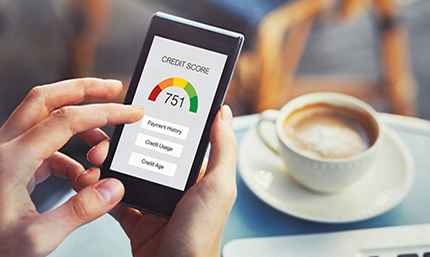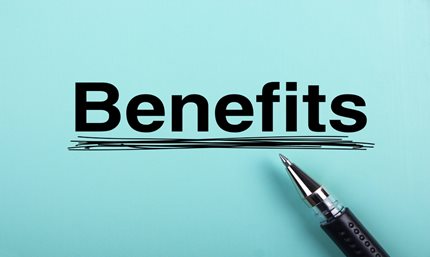News & Tips
The Beginner's Guide to a Good Credit Score (& How to Get One)

When you want to borrow money—perhaps for a mortgage or a car loan—or to get approved for a credit card, lenders typically require a decent credit score. But, what is a good credit score, and how can you make sure you have one? In this article, we’ll give you a crash course on what a credit score is, why a good score matters, how they’re calculated, how to find out what you have, and how to improve upon those numbers to build or rebuild your credit.
What is a Credit Score?
The Federal Trade Commission (FTC) defines a credit score as a “number that represents a rating of how likely you are to repay a loan and make the payments on time.” And, as Equifax—one of the three major credit bureau agencies in the United States—notes, people actually have multiple credit scores (more about that later in this post).
In general, a credit score is a three-digit number, usually ranging between 300 and 850, that represents what the FTC describes: the likelihood that you’ll pay your debts on time. The higher the score, the better your chances typically are of getting approved for loans and with more favorable rates and terms.
Credit bureaus calculate scores using credit report information, although they can use different algorithms to come up with results.
Credit Score Factors
Using FICO® as an example of a credit score often used by lenders, there are five factors that go into calculations:
Payment history: 35%
This is the most important factor because past actions are a good indicator of future ones—and lenders will want to know if you’ve paid your bills on time. Bills taken into account include mortgages, installment loans (car, personal, student, and so forth), credit cards, and more.
Overdue payments and the number of accounts in arrears (behind on payments owed) negatively impact scores. The amount of delinquent dollars and how overdue they are also have negative impacts. Bankruptcies and foreclosures can have an especially significant impact on this portion of a credit score calculation.
Amount owed: 30%
At a high level, this refers to how much debt you have overall. What’s more important, though, is your credit utilization percentage. To calculate yours, first add up all of your balances on any open lines of credit (such as credit cards). Then, divide that amount by the sum of your credit limits. Ideally, you will be using less than 30% of what’s available to you. A low utilization rate can signal to lenders that you can manage the credit you’re given. On the other hand, maxing out credit cards can raise a red flag.
Note that, even if you pay off credit card balances in full each month, the balance listed on a credit card may not be zero if the lender reports the balance before you’ve made your payment.
Length of credit history: 15%
Your FICO Score will factor in how long you’ve had credit accounts, the average age of them, plus the age of the oldest account and the newest. The algorithm also considers how long it’s been since you’ve used your accounts. Overall, having a longer credit history is a plus, but it isn’t an absolute requirement to have a good credit score.
This leads to a commonly asked question: Once you pay off a credit card balance, should you close it if you don’t want to build up a balance again? Each situation is unique, but it can make sense to consider what effect this could have on your credit history’s length—and, therefore, your credit score.
Credit mix: 10%
This term refers to the types of credit you have. For example, someone could have a mortgage, installment loans (perhaps a car loan and a student loan), and credit card accounts. Although you don’t need to have each of these kinds of credit, having a mixture can show lenders that you can successfully manage more than one type.
Perhaps you rent an apartment rather than owning a home. You may still have more than one type of credit, though; for example, you might have a student loan (installment) and a credit card (revolving). An installment loan typically comes with a fixed monthly payment that you make over a predetermined term until the balance is paid off in full. Meanwhile, a revolving account comes with a credit limit that you can flexibly use, pay down, and then use again.
New credit: 10%
If you apply for too many credit accounts in a short period of time, this can hurt your scores—especially if you haven’t yet built up a solid credit history. When there are too many new accounts, this automatically lowers the average age of your credit accounts, negatively impacting FICO scores. Plus, the act of applying too often can lower a credit score, even if the applications aren’t approved.
There’s a difference, though, between a hard inquiry (hard credit check/hard pull) and a soft one. With a hard pull, a financial institution checks your credit to make a lending decision. Although just one hard inquiry may not impact your credit scores at all, having too many could temporarily lower them by a few points. These inquiries show up on your credit report for two years, and lenders could interpret multiple inquiries as a sign that you’re short of cash and in need of numerous sources of credit.
In contrast, a soft inquiry/pull/credit check is done to investigate a situation, perhaps to see which credit cards a borrower might qualify to have. Soft pulls don’t affect your credit scores and may not even be listed in credit reports. When you check your own scores, this is considered a soft credit check.
So, these five factors—payment history, amount of debt/credit utilization, credit history length, a mix of credit types, and new credit applications—are used to determine your FICO score, one that financial institutions often use when making lender decisions. Other credit bureaus (with Experian and TransUnion being the other two) may use slightly different calculations for their scores. As a member of Space Coast Credit Union, you can check your FICO score for free.
What is a Good Credit Score?
Continuing with FICO as our example, here is how credit scores are categorized:
- Exceptional: 800-850
- Very Good: 740-799
- Good: 670-739
- Fair: 580-669
- Poor: 300-579
Lenders can each have their own guidelines and minimum scores that they require for loan approvals. As a literal answer, though, a lender using FICO for credit checking would consider a “good” score to be 670-739 with higher scores above that to be “very good” or “exceptional.”
Types of Credit Scores
Two men, Bill Fair and Earl Isaac, created a system to determine credit scores in the 1950s, one that evolved into FICO. Then, when the government passed the Fair Credit Reporting Act in 1970, a system was formed to decide what information could be reported to them and how it could be used to determine a borrower’s creditworthiness.
Creditors may report your information to each of the three main credit bureaus, but they don’t have to. They may report to just one of them if that’s their policy. This is one reason why credit scores can vary from bureau to bureau, with each agency’s algorithm then sifting through this information in somewhat different ways.
To add to the complexity, there are now multiple FICO scores and lenders can choose industry-specific ones or ones designed for a particular type of loan. Plus, as FICO has evolved, the company has created different versions—with lenders able to choose which version to use.
In addition, VantageScore is an alternative credit score that many lenders use. Created in 2006, there are several versions of this score as well. VantageScore 3.0, for example, takes a borrower’s rent and telecom payments into consideration with the 4.0 version incorporating those and using a person’s credit history over a range of time instead of providing a single snapshot moment. Although VantageScore 2.0 uses a numerical system of 501-990, versions 3.0 and 4.0 now matches FICO’s range of 300-850.
Some lenders use custom-made scoring models that they’ve built internally or purchased from a third-party vendor. Most of those also use the same numerical ranges.
Checking Your Credit
First, there’s a distinction between credit history and a credit score. A credit history is a more comprehensive report that contains a listing of a consumer’s credit accounts, balances on each, and the specifics of past payments. Reports would include any overdue debts, liens, judgements, collection agency actions, bankruptcies, and foreclosures. These reports are regularly updated based upon information submitted to the credit bureaus.
You can get a free credit report from each of the national credit bureaus at AnnualCreditReport.com. In fact, during the pandemic, the site permits people to get these reports online weekly. You can request the reports at the site; by calling a toll-free number (877-322-8228); or printing and filling out the site’s request form and mailing it to P.O. Box 105281, Atlanta, Georgia 30348-5281.
Meanwhile, your credit score is the three-digit number that's derived from these reports. Typically, a lender will use these scores to decide the creditworthiness of an applicant, and this score can go up or down based on credit-related factors described earlier in this post.
There is no official source for credit scores although a credit bureau may provide them to you upon request. There are also companies that offer credit monitoring (either free or for a fee), and, as part of that service, will provide you with your current credit scores.
To help, here’s a free credit score resource that provides more insights and a worksheet to track your scores.
Why a Good Credit Score Matters
When applying for a loan or credit card, lenders frequently have three main issues they consider when deciding whether to approve the application—and, if so, at what rate and terms:
- Credit scores
- Income and employment
- Debt-to-income ratio (DTI)
So, in addition to having a good credit score, they’ll check to see if you have steady employment that provides you enough income to pay your current debts along with the new loan. To prove this, they may ask for pays stubs, bank statements, or tax returns.
The lender will probably also have a DTI requirement. To determine yours, add up your monthly debt payments, such as ones for your mortgage/rent, car, student loan, personal loan, and credit cards. Let’s say the total is $1,000.
Now add up your gross (before tax) monthly income. For our example, we’ll use $3,000. Now divide your debts by your income ($1,000/$3,000) and you have a DTI of 33.3%. If a lender has a DTI requirement of 36%, this means that you can’t exceed that percentage when including your new loan.
All of these factors can play a part in determining the loan’s interest rate and required down payment. Next up, we’ll look at a specific loan type where having a good credit score matters—and then we’ll share tips on how to build or repair yours.
Credit Score to Buy a House
What’s the credit score you need to buy a house? First, it depends upon what kind of mortgage you’re applying for. A credit score requirement for an FHA loan may be different than one for a VA loan, for example. Here’s an overview:
- FHA loan credit score requirements: These vary based on the down payment made. If a borrower puts down 10%, the minimum credit score required is 500. If they put down 3.5%, the minimum is 580. Note that these are FHA guidelines, lenders may choose to require higher scores. Here’s more FHA loan credit score information.
- VA loan credit score requirements: Officially, there isn’t one, although many lenders that provide this kind of mortgage prefer a minimum score of 620. Here is more information. While many lenders’ loan rates will vary depending on your credit score, SCCU offers VA loans at the same interest rate, regardless of credit score.
When it comes to a conventional mortgage—ones that aren’t backed up by the federal government—the credit score to buy a house can vary by lender. Conventional mortgages, though, do come with federal oversight through the U.S. Department of Housing and Urban Development, underwritten by Freddie Mac and Fannie Mae.
In general, a credit score to buy a house via a conventional mortgage is 620 or above although some lenders will go as low as 580. Check with your lender of choice for specifics and for their answer to the question of “What is a good credit score?” or at least, the score that you need for them to approve a loan request.
So, what if you haven’t yet built up a credit history or you need to rebuild your credit? Here are tips.
Building a Credit Score
One of the easiest ways to build credit is to open a credit card. You can use the card to make purchases, reserve hotel rooms and rental cars, and more. Once you have a card, follow FICO Score guidance to create a good credit history from the get-go. For example, don’t apply for too many cards at once, keep your usage under 30%, and make all your payments on time.
This, of course, raises the question of how to get a credit card without a credit history. Fortunately, options are available:
1. Student Credit Cards
SCCU offers a student credit card to help students aged 15 to 18 establish credit in ways that safeguard them as they build up their credit history for a financially secure lifestyle. More specifically, the card starts with a low line of credit, and as needs change and a credit history is built, the amount can be increased. In addition, this card requires a co-signer and a savings account can be used as collateral (more about that next).
2. Secured Credit Cards
A secured credit card, like this SCCU card, can be a good way to initially establish credit as well as to rebuild credit. Most credit cards are unsecured. Here’s how a secured one works: The applicant opens a secured credit card account by first putting down a deposit, which is collateral and reduces risk for the lender. If the credit card holder doesn’t pay a bill, the credit card issuer uses money from the deposit to pay it. Other than this element, a secured card works the same as an unsecured one, and places that accept your card won’t know that it’s secured.
At SCCU, you can use your regular savings account as collateral. Then, after you complete a year of good payment history, you can apply for our unsecured Visa Platinum credit card with cashback rewards.33
3. Authorized User
You can ask a friend or family member if you could become an authorized user on their credit card. If someone is willing to do this for you and the financial institution allows it, you can get added to this account and, with permission from the account holder, you would get a card to use. Then, when this person makes payments on time, it may help build your credit.
4. Get a Co-Signer
If someone with good credit co-signs your credit card application (a requirement for SCCU’s student credit card), then they’re guaranteeing that they’ll make your payments if you don’t. This can reassure a lender and increase chances for approval. If payments are late, though, this can hurt your credit score as well as the co-signer’s.
5. Request Credit Limit Increases
If you’ve already got a credit card, perhaps with a small limit, you can ask your financial institution to increase the available credit limit because of your good payment history. If this gets approved, continue to pay on time and meet the credit utilization ratio.
6. Talk to an Applicable Credit Union
Because credit unions are owned by members rather than stockholders, financial products and services are created and implemented to benefit members instead of boosting profits. This includes credit card programs, which are designed to offer members the best deals. Many times, this means that an applicant has a better chance of getting approved on a credit card application with credit unions also offering education to members to optimize their financial wellness.
As you build your credit history, you’re more likely to get approved for other types of loans, whether that’s a car loan, a mortgage, or something else.
Rebuilding Your Credit
According to the Consumer Financial Protection Bureau, ways to boost your credit scores include making all payments on time, staying well under the maximum credit available, avoiding applying for too many accounts, considering a secured credit card or getting a co-signer, and paying off balances in full each month. In addition, check your credit reports and, if you find any errors, contact the credit bureaus or creditors to request corrections.
Benefits of Using a Credit Union
Credit unions are not-for-profit financial cooperatives owned by their members. When you become a member, you benefit from personalized services, available financial wellness resources, and typically lower loan and credit card interest rates.
At SCCU, we provide plenty of practical financial education, including articles, financial calculators, a budgeting worksheet, and more, including an auto buying center and home buying center.
SCCU is Florida’s third-largest credit union, serving more than 600,000 members in these counties both online and in 60+ branch locations that span the east coast of our state from Flagler to Miami-Dade counties. Assets total more than $7 billion.
Our mission is “To Create Value in Cooperative Ownership,” and we focus on that mission in all we do. As an added benefit, decision-making is local.
Lending products we offer include:
- Home loans
- Home equity loans
- Mortgage refinance loans
- Vehicle loans for purchase or refinance
- Boat, RV and motorcycle loans
- Personal loans
- Credit cards
At SCCU, members benefit from low-interest rates on loans with better deals on checking accounts and savings accounts.
If you’re looking for a credit card to build or rebuild your credit, our Visa accounts come with plenty of benefits, including the following:
- Free Online Banking
- Free Mobile Banking
- Free 2Way Text Fraud Alerts
- Contactless payments
- Manage Cards within Online & Mobile Banking:
- Ability to turn off your card if it’s lost or stolen
- Card alert customization
- Usage preference settings
- Free FICO® Score
- Roadside assistance
- Visa account updater to share current information about participating merchants
You can apply for accounts online and, if you have questions, or call us.

















































